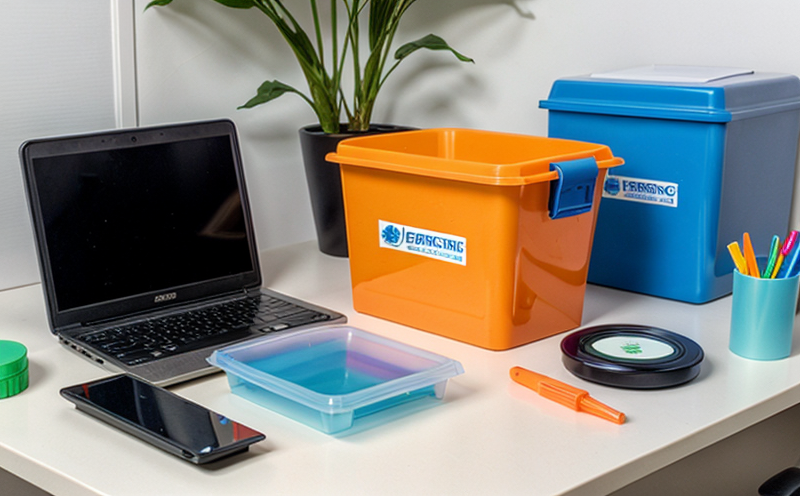ASTM D882 Tensile Testing of Thin Plastic Stationery Films
The ASTM D882 standard method is widely recognized as a critical tool in ensuring the quality and durability of thin plastic films used in stationery products. This testing procedure evaluates the tensile properties, including ultimate tensile strength (UTS), elongation at break, and modulus of elasticity, which are essential for assessing the performance and reliability of such materials.
Thin plastic films in stationery products often face various stresses during use, from simple handling to environmental factors like temperature changes. Understanding these mechanical properties helps manufacturers ensure that their products meet safety standards and customer expectations. The ASTM D882 test is particularly useful for identifying any weaknesses or areas of improvement in the design and manufacturing process.
The testing procedure involves subjecting a small specimen, typically cut from the plastic film, to gradually increasing tensile forces until it fails. This failure point provides critical data on the material's strength and flexibility. The specimen geometry is standardized according to ASTM D882 specifications to ensure comparability between different samples.
Accurate preparation of the specimens is crucial for reliable test results. Proper sample cutting, conditioning, and alignment are essential steps that must be meticulously followed. These processes help minimize variability in the testing data, ensuring that any observed differences can be attributed to the material's inherent properties rather than external factors.
The testing equipment used for ASTM D882 typically includes a tensile tester capable of applying controlled forces with high precision. The system should have a range that accommodates both low and high stress applications typical in this type of test. Calibration of the equipment is essential to ensure accurate measurements, as small variations can significantly impact the results.
The ASTM D882 standard specifies acceptance criteria based on statistical analysis of multiple replicate tests. These criteria help determine whether a batch or lot of plastic films meets the required quality standards. Compliance with these criteria ensures that products are safe and reliable for their intended use in stationery items such as notebooks, folders, and other office supplies.
Understanding the results from ASTM D882 testing is crucial for both manufacturers and end-users. The data provides insights into how well the materials will perform under expected conditions, helping to optimize product design and improve overall quality. For manufacturers, this information can guide improvements in material selection or process optimization. For end-users, it ensures that they receive products with consistent and dependable performance.
Customer satisfaction is directly linked to product reliability, which is where thorough testing plays a vital role. By adhering strictly to standards like ASTM D882, manufacturers demonstrate their commitment to quality and safety, fostering trust among consumers.
- Customer Impact: Enhanced confidence in the durability and safety of stationery products.
- Satisfaction: Reduced complaints about product failures or poor performance.
Eurolab Advantages
Eurolab stands out as a premier service provider for ASTM D882 tensile testing of thin plastic stationery films. Our experienced team of professionals ensures that every test is conducted with precision and accuracy, adhering strictly to the latest standards and guidelines.
Our state-of-the-art facilities are equipped with top-tier instrumentation that guarantees reliable and repeatable results. This cutting-edge equipment allows us to provide detailed reports that not only meet but exceed industry expectations. With Eurolab, you can be confident in the quality of your testing services.
We pride ourselves on delivering timely and accurate results, which is crucial for maintaining production schedules and meeting customer demands. Our commitment to excellence extends beyond just the technical aspects; we also offer comprehensive support throughout the entire testing process, from specimen preparation to final report delivery.
Our extensive experience in this field allows us to provide valuable insights into potential areas of improvement based on our findings. This proactive approach helps you stay ahead of the competition and ensure your products meet all necessary regulatory requirements.
Customer Impact and Satisfaction
The impact of ASTM D882 testing extends beyond just the technical aspects; it significantly enhances customer satisfaction by ensuring that stationery products are durable, safe, and reliable. Consumers appreciate knowing they are using high-quality materials that meet stringent standards.
- Customer Impact: Increased trust in brand reputation due to consistent product quality.
- Satisfaction: Higher repeat purchase rates as a result of customer confidence in the products' performance and safety.
By leveraging ASTM D882 testing, manufacturers can differentiate themselves from competitors by offering superior products. This not only attracts more customers but also builds long-term relationships based on mutual trust and reliability.
In addition to enhancing brand reputation, successful ASTM D882 tests contribute to improved operational efficiency within manufacturing facilities. By identifying potential issues early in the production process, companies can implement corrective actions promptly, reducing waste and improving overall productivity.
Use Cases and Application Examples
ASTM D882 testing is applicable across various sectors where thin plastic films are used in stationery products. Some common use cases include:
- Notebook production: Ensuring that notebook covers meet durability requirements.
- Folder manufacturing: Evaluating the strength of folder spines to withstand repeated opening and closing.
- Paper clip packaging: Assessing the tensile properties of plastic inserts used in paper clips for added stability.
In each case, ASTM D882 provides valuable insights into how well the materials will perform under real-world conditions. This information is invaluable for optimizing product design and improving overall quality.
A real-world example would be a manufacturer of notebook covers who uses ASTM D882 to ensure that their products can withstand daily wear and tear without degrading over time. By adhering strictly to the standard, they can guarantee that their notebooks will remain sturdy throughout their lifecycle, enhancing user experience and satisfaction.





